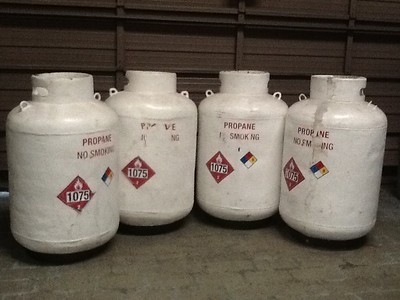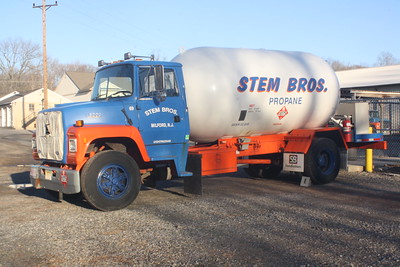
Propane and natural gas are not the same. Propane is a type of petroleum gas, while natural gas is a type of flammable gas that is found naturally underground. Propane is used in a variety of applications, including BBQ grills, home heating, and as a fuel for vehicles. Natural gas is used primarily for refrigeration and cooling equipment.
Natural gas is delivered via pipelines to your home while propane is stored in tanks on your property. Propane is much more flexible to use that’s why propane is the choice of many homeowners for many types of applications.
While both propane and natural gas are used as fuel sources, they are not the same. Propane is a hydrocarbon gas that is derived from petroleum, while natural gas is a gas composed of methane and other hydrocarbons. Propane is typically used in grilling, heating, and as a fuel source for vehicles, while natural gas is used to heat homes and power electric plants.
What is propane?
Propane is a flammable gas that is often used as a fuel source. It is similar to natural gas in that it is composed of methane, but it also contains other hydrocarbons. Propane is typically stored as a liquid in tanks and is converted to a gas when it is used. It burns cleaner than other fossil fuels, making it a popular choice for many applications.
- Heating: Propane is a popular fuel for heating homes and buildings, particularly in areas where natural gas is not available. It is also used to heat water in some homes.
- Cooking: Propane is used as a fuel for cooking in both residential and commercial settings. It is commonly used for outdoor grilling and in portable stoves.
- Drying clothes: Propane is used as a fuel for some clothes dryers, particularly in areas where natural gas is not available.
- Generating electricity: Propane is sometimes used as a fuel for generating electricity in remote locations or in emergency situations.
- Transportation: Propane is used as a fuel for some vehicles, such as buses and forklifts.
- Recreational vehicles: Propane is used as a fuel for heating and cooking in recreational vehicles, such as RVs and campers.
- Industrial processes: Propane is used as a fuel in a variety of industrial processes, such as the production of steel and concrete.
What is natural gas?
Natural gas is a type of fossil fuel that is formed from the decomposition of organic matter over millions of years. It is a nonrenewable resource that is used to generate electricity and heat. Natural gas is composed of methane, a gas that is odorless and colorless. Propane is also a type of fossil fuel, but it is a hydrocarbon that is derived from natural gas. Propane is a liquid at room temperature and is used as a fuel for heating, cooking, and vehicle engines.
Its uses are:
- Heating: Natural gas is widely used as a fuel for heating homes and buildings. It is also used to heat water in some homes.
- Cooking: Natural gas is commonly used as a fuel for cooking in residential and commercial settings. It is often used to fuel stoves, ovens, and other cooking appliances.
- Electricity generation: Natural gas is used as a fuel for generating electricity in power plants. It is a popular choice for electricity generation due to its relatively low cost and its clean-burning properties.
- Industrial processes: Natural gas is used as a fuel in a variety of industrial processes, such as the production of chemicals, metals, and glass.
- Transportation: Natural gas is used as a fuel for some vehicles, such as buses and forklifts. It is also used as a fuel for some marine vessels.
- Refrigeration: Natural gas is used as a refrigerant in some refrigeration systems.
- Drying clothes: Natural gas is used as a fuel for some clothes dryers.
Read related article: Is Propane Dirtier Than Natural Gas? (Which is the Culprit)
What are the similarities between propane and natural gas?
Propane and natural gas are both used as fuel sources for a variety of applications. They are both colorless, odorless gases that are flammable and combustible. Propane is derived from natural gas processing and petroleum refining, while natural gas is simply methane that is found in underground reserves. Although they are similar, there are some key differences between propane and natural gas.
Propane is stored and transported in pressurized tanks, while natural gas is transported through pipelines. Propane is also a liquefied petroleum gas (LPG), meaning that it is a liquid at room temperature, while natural gas is in a gaseous state. Propane has a higher energy density than natural gas, meaning that it contains more energy per unit of volume. Lastly, propane can be used in off-grid applications, while natural gas requires a pipeline connection.
What are the differences between propane and natural gas?
The main difference between propane and natural gas is that propane is a type of petroleum gas while natural gas is a type of methane gas. Propane is a gas at room temperature and pressure but can be liquefied if cooled or compressed. Natural gas is also a gas at room temperature and pressure but is composed of methane.
The two gases are not the same, but they are similar. Both are used as fuel sources and have very similar combustion characteristics. The main difference is that propane is a lot more efficient than natural gas. Propane also has a higher octane rating, which means it can be used in higher-performance engines.
How is propane produced?
Propane is produced as a by-product of natural gas processing and petroleum refining. It is typically separated from these materials using a process called fractional distillation. In this process, the various components of the gas are separated by their boiling point. Propane has a boiling point of -42 degrees Celsius, so it is typically the last component to be distilled.
Propane is also produced as a by-product of the production of ethylene and propylene, which are used to make plastics. In this process, called steam cracking, ethane and propane are cracked at high temperatures to produce these other materials. A small amount of propane is also produced naturally by the decomposition of organic matter.
How is natural gas produced?
Natural gas is a fossil fuel that is found underground. It is composed of methane and other gases. Natural gas is produced when organic materials are subjected to high temperatures and pressures over millions of years. Propane is a by-product of natural gas production. It is a liquefied gas that is stored under pressure. Propane is used for heating, cooking, and powering vehicles. It is also used as a fuel for lanterns and portable generators. Propane and natural gas are not the same, but they are similar.
Environment Impact of the Two
A. Emissions comparison between propane and natural gas
- Propane burns cleaner than many other fuels and produces fewer greenhouse gases than gasoline, diesel, and electricity in many cases.
- Natural gas is the cleanest burning fossil fuel. It emits less sulfur, carbon, and nitrogen than oil and coal, but concerns about methane emissions during extraction and transportation can lessen this advantage.
B. Impact on climate change
- Propane has a lower carbon footprint than gasoline, diesel, coal, and electricity in many scenarios because it emits less carbon dioxide and fewer pollutants.
- Natural gas is often touted as a ‘bridge fuel’ to a low-carbon future due to its lower carbon emissions when burned compared to coal or oil. However, unburned methane – a potent greenhouse gas – released during the natural gas lifecycle, may undermine its climate benefits.
C. Sustainability aspects of propane and natural gas production
- Propane is a byproduct of natural gas processing and petroleum refining; its production is linked to the sustainability practices of these industries. There is also research into renewable sources of propane, such as bio-propane, which offers a more sustainable alternative.
- Natural gas extraction and production have improved with technologies like combined cycle gas turbines and efforts to reduce flaring and venting. The development of biogas and synthetic natural gas (SNG) from renewable sources also contributes to the sustainability of natural gas. However, the overall sustainability is affected by issues like methane leaks and the energy-intensive nature of fracking.
This outline compares the key environmental impacts of both gases. It provides a snapshot that shows propane has certain advantages, especially in settings without a natural gas infrastructure, while natural gas benefits from an established supply chain and its status as a lower-emission alternative to other fossil fuels. However, both face sustainability challenges, particularly in how they are produced and managed throughout their lifecycle.
What are the costs of propane and natural gas?
The cost of propane and natural gas can vary depending on the supplier, but both are generally affordable options for heating your home. Propane is typically a bit cheaper than natural gas, but the price difference is usually not significant.
In terms of environmental impact, natural gas is the cleaner option, but propane can still be a good choice if you are looking for an affordable and efficient way to heat your home.
| Economic Factor | Propane | Natural Gas |
|---|---|---|
| Price Volatility and Market Trends | Can be subject to seasonal demand and supply disruptions, often leading to price fluctuations. | Generally has more stable prices, but can be affected by geopolitical factors and global market changes. |
| Infrastructure and Maintenance Costs | Requires storage tanks and delivery infrastructure, which can be costly to install and maintain. | Relies on existing pipeline networks, which usually have lower maintenance costs for end-users but can be expensive to extend to new areas. |
| Economic Benefits and Incentives | Some regions offer incentives for switching to propane in vehicles or off-grid energy solutions. | May come with utility rebates or tax incentives, especially when upgrading to more efficient appliances or for new construction. |
How natural gas and propane are delivered
Natural Gas
Natural gas is typically delivered through a fixed pipeline system. This network of pipelines is connected to the municipal supply, which in turn is connected to individual homes and businesses. The gas is delivered as needed, and usage is typically metered for billing purposes. This system means that natural gas is continuously available to the consumer as long as the infrastructure is intact and the supply is maintained.
Propane:
Propane, on the other hand, is usually stored in liquid form in large tanks located at the user’s property. These tanks are refilled by delivery trucks from local suppliers. The consumer orders a refill when the propane level is low, or they might be on a regular delivery schedule that ensures they never run out. Propane tanks come in various sizes, and the choice of size can depend on the consumer’s usage rate and storage space.
How to choose between propane and natural gas
There are many factors to consider when choosing between gas and propane. The two main types of gas are natural gas and propane. Natural gas is the most common type of gas, but propane is also a popular choice. Each type of gas has its own benefits and drawbacks. Here are some things to consider when choosing between gas and propane:
- Cost: Propane is typically more expensive than natural gas. However, propane costs can vary depending on the market.
- Availability: Natural gas is more widely available than propane. However, propane is available in many rural areas where natural gas is not.
- Efficiency: Propane is typically more efficient than natural gas. This means that you will use less propane to achieve the same effect as natural gas.
- Environmental impact: Natural gas is a cleaner burning fuel than propane. This means that it has less of an impact on the environment.
Ultimately, the decision of whether to choose gas or propane depends on your individual needs and preferences. Consider the cost, availability, efficiency, and environmental impact of each type of gas before making a decision.
Which fuel is better for your needs?
There are a few key differences between propane and natural gas that may make one or the other a better choice for your needs. Propane is a liquefied petroleum gas (LPG) whereas natural gas is a methane gas. Propane is stored and transported in tanks as a liquid and turns into gas when released, whereas natural gas is transported through pipelines as a gas.
Propane is typically more expensive than natural gas per unit of energy. However, propane appliances are often more efficient than natural gas appliances, so you may end up spending less on propane in the long run. There are some other disadvantages of using propane.
Propane is a cleaner burning fuel than natural gas and produces less carbon emissions. It is also a non-renewable resource, so if you are looking for a more sustainable option, natural gas may be the better choice.
| Applications and Uses in Daily Life | Propane | Natural Gas |
|---|---|---|
| A. Residential Uses | ||
| Heating | Propane furnaces, Propane-powered fireplaces, Propane space heaters | Natural gas central heating systems, Natural gas fireplaces, Natural gas space heaters |
| Cooking | Propane stoves and ovens, Outdoor propane grills | Natural gas stoves and ovens, Natural gas grills (with gas line connection) |
| Water Heating | Propane water heaters | Natural gas water heaters |
| B. Commercial Applications | ||
| Heating | Propane heating for warehouses and large spaces | Natural gas heating systems for buildings |
| Cooking | Propane for commercial kitchens and catering | Natural gas for restaurant kitchens |
| Agriculture | Propane for crop drying and greenhouses | Natural gas for co-generation in agriculture |
| Generators | Propane backup generators | Natural gas backup generators |
| C. Specialized Uses in Industry and Transportation | ||
| Industry | Metal cutting and soldering with propane torches, Propane for forklifts and machinery in warehouses | Natural gas for industrial boilers and furnaces, Natural gas in co-generation power plants |
| Transportation | Propane autogas for buses and fleets, Propane for off-grid power generation | CNG (Compressed Natural Gas) for vehicles, LNG (Liquefied Natural Gas) for heavy-duty transport |
Safety tips for using these gases
| Safety Tips | Propane | Natural Gas |
|---|---|---|
| Installation | Must be installed by a certified professional and regularly inspected for leaks. | Should be installed by a qualified technician; pipelines must be regularly checked. |
| Detectors | Install propane gas detectors in your home to alert you of any leaks. | Install natural gas detectors to promptly identify leaks. |
| Ventilation | Ensure proper ventilation in areas where propane appliances are used. | Make sure rooms with natural gas appliances are well-ventilated. |
| Leak Response | If you suspect a leak, turn off the main valve, evacuate, and call for help from a safe distance. | If a leak is detected, don’t turn any electrical switches on or off, leave the area, and contact authorities. |
| Odor Awareness | Propane is odorized with a strong scent for leak detection – be aware of this smell. | Natural gas is also odorized; recognize the ‘rotten egg’ smell as a warning sign. |
| Appliance Maintenance | Regularly service and maintain all propane-using appliances. | Have appliances that use natural gas serviced by professionals regularly. |
| Emergency Preparedness | Know how to shut off propane supply and have a fire extinguisher handy. | Familiarize yourself with the main gas valve and have a fire extinguisher accessible. |
FAQs
A. Can you use propane and natural gas interchangeably? No, you can’t switch between propane and natural gas without some adjustments. Each gas needs different equipment, but you can get a conversion kit if you need to switch.
B. Which is better for the environment, propane or natural gas? Propane is generally better for the environment. It produces fewer greenhouse gases than natural gas when you burn it, and there’s less risk of leaks.
C. What should you do if there’s a gas leak? If you smell gas or suspect a leak, leave the area right away, then call for help from a safe distance. Don’t use any electronics or flames, as they can start a fire or explosion.
D. How can you decide if propane or natural gas is better for you? Think about what’s available in your area, how much it costs, and what you need the gas for. Propane is often the go-to for places without natural gas lines. If you live in the city, natural gas might be easier and cheaper to get. Talk to a local energy provider to figure out what’s best for your home.

Mike is an experienced propane technician with over 15 years of professional experience in the field. He has dedicated his career to helping customers with their propane needs, from installation to maintenance and repair. Together with Jeremy, he co-founded this website to provide useful information and guidance to customers seeking reliable propane services.



